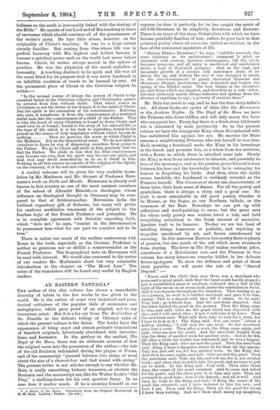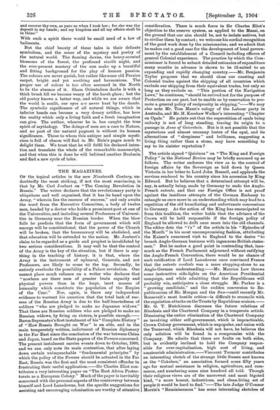THE author of this slim volume has shown a remarkable
diversity of talent in the few works be has given to the world. He is the author of some very trenchant and para.- doxical criticisms of the popular idols of economics and metaphysics, which gave proof of an original, not to say irreverent, mind. But it is a far cry from The Realisation of the Possible to the delicate trilogy of Oriental tales of which the present volume is the latest. The books have the appearance of being exact and almost pedantic translations of Sanskrit originals, laboriously elucidated with introduc- tions and footnotes. In the preface to the earliest, The Digit of the Moon, there was an elaborate account of how the original came into the possession of the author,—the tale of the old Brahmin befriended during the plague at Poona, and of the manuscript "pressed between two strips of wood about the size of a cheroot-box and tied round with string." The present writer is not scholar enough to say whether Mr. Bain is really unearthing historic treasures, orwhether the Brahmin and the manuscript are, like Sir Walter Scott's " Old Play," a stalking-horse for his own sportive fancy. In no ease does it matter much. If he is amusing himself at our • A Heifer of the Dawn. Translated from the Original Manuscript by Ei W. Bain. London : Parker. [5s. net.]
expense, he does it perfectly, for he has caught the spirit of old folk-literature in its simplicity, directness, and humour. There is no trace of the sham Orientalism with which we have become painfully familiar of late; rather, he goes back to that primeval poetry where all races are united as children in the face of the communal mysteries of life.
"Mature Hindoo literature," he says, "exhibits precisely the same tendency as its architecture ; ornament is piled on ornament with aimless, tasteless extravagance, till the whole becomes nauseous, and all unity is smothered and annihilated under a load of rhetorical gewgaws. Just as the rank and luxuriant growth of a creeper will sometimes drain of its juices, dry up, and destroy the tree it was designed to adorn, so the over-development of gaudy rhetorical blossoms and effeminate literary prettinesses has desiccated and broken the spring of the Hindoo mind. Tho best things in the literature are just those which are simplest, and therefore as a rule oldest. Literary arabesque nearly always indicates and springs from the absence of anything to say ; a poverty of creative ideas."
Mr. Bain has much to say, and he has the true story-teller's art. All these books are cycles of tales, like the Deeanzeron or the Arabian Nights. In The Digit of the Moon we have the Princess who loves riddles, and will only marry the lover who can puzzle her. Every day there is a fresh story till female wit is exhausted by male pertinacity. So in the present volume we have the misogynist King whose ill-conducted wife has embittered him against her sex. He marries for State reasons a neighbouring Princess, who sets herself to woo him. Each mouning a handmaid seeks the King in his hermitage
in the forest, and presents him, as a token from her mistress, with a flower to which there is attached some tale. Slowly the King is won from intolerance to interest, and presently to love of the messenger, and as his passion grows his soul is torn between his love and the knowledge that he is outraging his honour in forgetting his bride. And then, when the riddle seems insoluble, the handmaid is suddenly revealed as the Princess herself. The d4nouentent shows one characteristic of these tales, their keen sense of drama. For all the poetry and symbolism, there is always a story, and a good one. No trait is more remarkable in old good poetry, whether it be Homer, or the Sagas, or our Northern ballads, or the romances of the East. Nowadays we can put up with reflections and word-painting in cacao, but the great men for whom early poetry was written loved a tale, and held everything subsidiary to the frank interest of narrative. Another trait is its humour. To-day we are too fond of labelling things humorous or pathetic, and rejoicing in tragedies unrelieved by wit, and farces unredeemed by meaning. In this sensuous Eastern love poetry there is plenty of passion, but also much of the salt which saves sweetness from cloying. The lover in The Digit makes excellent jokes, sometimes of a Rabelaisian cast, and the Princess in this volume has many humorous conceits hidden in her delicate flower-apologues. To show the deftness and point of these little parables we will quote the tale of the "Sacred Deposit" :—
"Know, said the Cheti, that once there was a merchant who possessed a great pearl, such that the hand could hardly grasp it ; and it resembled a mass of sea-foam, collected into a ball in the light of the moon on an ocean shell, under the constellation Sweiti. And it was famous throughout the kingdom. Then having to go on a journey, he went to a brother merchant and gave it to him, saying : This is a deposit with thee till I return. So he said : Very well ; go without fear. And the merchant departed. But the other buried the pearl in the ground. Then the King came to him, and said: Give me the pearl which was deposited with thee, and I will enrich thee ; if not, I will take it by force. Then the merchant said What wilt thou take to wait for a week, for I love to look at it ? The King said : For one crore " [about a million sterling] "I will wait for one week. SO the merchant gave him a croro. Then after a week, the King came again, and said : Give me now the pearl. And the merchant bought from him the delay of another week for another crore. And so he did, till after a while his wealth was exhausted, and he was a beggar. Then the King said: Give me now the pearl. Then the merchant said: King, I have a daughter, fairer by far than all thy queens. Take her, and sell me, for her, another week. So the King did. And then he came again, and said : Give me now the pearl. Then the merchant said : Take my life, and sell me, for it, yet another week ; and when that is ended, take the pearl, and promise to put mo to death. So the King said : Very well. Then after three days, the owner of the pearl returned. And he came and asked for his pearl; and the other gave it to him, and said: Thou art returned in good time : here is thy deposit ; and all is well. And then ho went to the King, and said : 0 King, the owner of the pearl has returned; and I have restored to him his own ; and hero I am. Then said the King : Thou art the pearl for whom I have been waiting. And now thou shalt marry my daughter,
and recover thy own, as pure as when I took her ; for she was thy deposit in my hands; and my kingdom and all my affairs shall be in thine."
With such a spirit there would be small need of a law of bailments.
But the chief beauty of these tales is their delicate symbolism, and the sense of the mystery and poetry of the natural world. The flaming dawns, the heavy-scented blossoms of the forest, the profound starlit night, and the ever-present mastery of the sun make up a beautiful and fitting background for the play of human passion. The colours are never garish, but rather like some old Persian carpet, bright and yet soothing and harmonious. The proper use of colour is too often assumed in the North to be the absence of it. Sham Orientalism daubs it with a thick brush till we become weary of the harsh glare ; but the old poetry knows a better way, and while we are aware that the world is sunlit, our eyes are never hurt by the dazzle. The symbolic significance of all natural things, which in inferior hands can become a very dreary artifice, has here the reality which only a living faith and a fresh imagination can give. The author, whoever he is, has caught the true spirit of mythology. The doings of men are a care to Nature, and no part of the natural pageant is without its human significance. Those to whom this antique and simple mysti- cism is full of charm will find in Mr. Bain's pages much to delight them. We trust that he will fulfil his declared inten- tion and translate the whole of the remarkable manuscript, and that when this is done he will befriend another Brahmin and find a new cycle of tales.







































 Previous page
Previous page